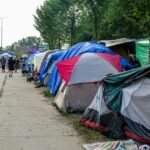 An upcoming hearing at the United States Court of Appeals for the Ninth Circuit has cast a spotlight on the ongoing debate surrounding treatment of homeless individuals in San Francisco. The heart of the matter surrounds a court order that temporarily bars city officials from dismantling tent encampments. This legal issue revolves around the enforcement of laws against involuntary homelessness and the availability of shelter beds.
An upcoming hearing at the United States Court of Appeals for the Ninth Circuit has cast a spotlight on the ongoing debate surrounding treatment of homeless individuals in San Francisco. The heart of the matter surrounds a court order that temporarily bars city officials from dismantling tent encampments. This legal issue revolves around the enforcement of laws against involuntary homelessness and the availability of shelter beds.
In a pivotal ruling last December, a federal magistrate judge dictated that San Francisco city officials cannot enforce or threaten actions against homeless individuals resting on city streets. This decision was grounded in the belief that, given the insufficient number of shelter beds, punishing those without adequate access to shelter would violate the Eighth Amendment’s prohibition of cruel and unusual punishment. The ruling raises questions about the intersection of homelessness and government responsibility.
The city argued that it has already spent millions of dollars on housing and addressing homelessness, and that many times, people refuse offers to move to shelters. Per the city’s motion, “[i]t is not the law nor is it practical… it would cost San Francisco $1.5 billion and at least 5 years – to house everyone now living on San Francisco’s streets.”
Defining “Involuntary Homelessness”
A central point of contention is the definition of “involuntary homelessness.” The outcome of the appeal will shape the extent of the city’s authority to conduct what are often referred to as “homeless sweeps.”
In anticipation of the hearing, a coalition comprised of businesses, community groups, and city officials is set to voice its concerns about the court order. Mayor London Breed and several supervisors plan to highlight the city’s initiatives to address homelessness and substance abuse issues. These individuals believe that the order may inadvertently hamper progress by preventing certain measures aimed at enhancing the city’s resources.
Challenging Strategies
Opponents of homeless encampment sweeps argue that the city’s focus should shift from enforcement to solutions that address the underlying issues. Advocacy group Coalition on Homelessness, which initiated the suit, contends that massive sweeps are not a viable solution. Instead, they emphasize the need for a holistic approach that emphasizes care, support, and increased shelter capacity. The coalition asserts that permitting sweeps could lead to unintended consequences, such as the unlawful confiscation of belongings and the further criminalization of poverty.
The advocacy group maintains that city officials bear a responsibility to explore alternatives that directly tackle the root causes of homelessness. They emphasize the importance of diverting resources toward increasing shelter capacity and affordable housing options. The ongoing lawsuit serves as a tool to exert pressure on officials to address the core problems facing the city’s unhoused population.
The Constitutional Angle
Beyond the legal intricacies, the lawsuit highlights a constitutional aspect that extends to the right to occupy public spaces. Advocates argue that public spaces should be accessible to all citizens, regardless of their housing situation. They contend that criminalizing involuntary homelessness exacerbates the issue and fails to address its underlying causes.
As the Ninth Circuit appeal hearing approaches, the complexities surrounding San Francisco’s homelessness crisis remain in the spotlight. Balancing legal considerations and practical solutions is an intricate endeavor. The outcome of this hearing will undoubtedly influence the trajectory of efforts to address homelessness in San Francisco, and across the country.